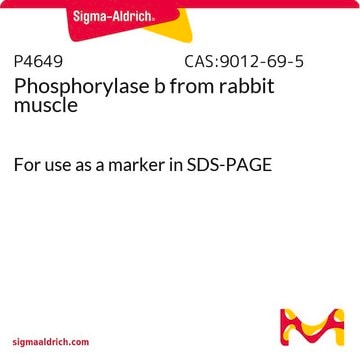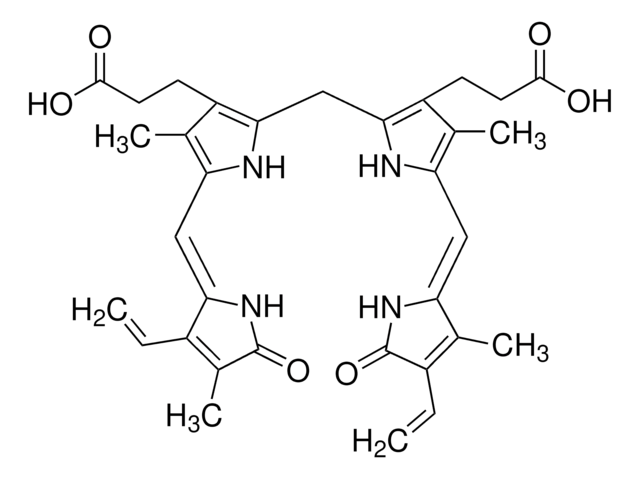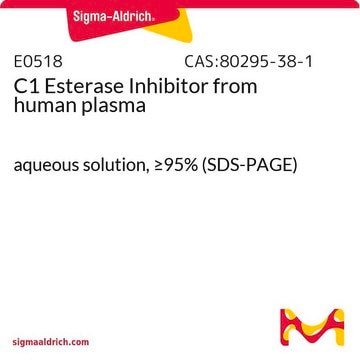P4798
L-Phenylalanine Dehydrogenase from Sporosarcina sp.
lyophilized powder, ≥6 units/mg solid
Sign Into View Organizational & Contract Pricing
All Photos(1)
About This Item
CAS Number:
MDL number:
UNSPSC Code:
12352204
NACRES:
NA.54
Recommended Products
biological source
bacterial (Sporosarcina sp.)
Quality Level
form
lyophilized powder
specific activity
≥6 units/mg solid
storage condition
dry at room temperature
concentration
≤100%
color
white to light brown
application(s)
life science and biopharma
storage temp.
−20°C
General description
Research area: CELL SIGNALING
Phenylalanine dehydrogenase is a member of a large family of amino-acid dehydrogenases, which includes glutamate dehydrogenase, alanine dehydrogenase, leucine dehydrogenase, lysine €-dehydrogenase, and meso-a,€-diaminopimelate D-dehydrogenase. The three known gene sequences are octomers. It has a two-domain, three-dimensional structure.
Phenylalanine dehydrogenase is a member of a large family of amino-acid dehydrogenases, which includes glutamate dehydrogenase, alanine dehydrogenase, leucine dehydrogenase, lysine €-dehydrogenase, and meso-a,€-diaminopimelate D-dehydrogenase. The three known gene sequences are octomers. It has a two-domain, three-dimensional structure.
Biochem/physiol Actions
Phenylalanine dehydrogenase (PheDH) is considered an effective enzyme to estimate the quantity of phenylalanine to distinguish phenylketonuria (PKU) disease.Moreover, it is utilized for the production of optically pure l-phenylalanine, a key component of the artificial sweetener aspartame. L-Phenylalanine dehydrogenase is a NAD+-dependent oxidoreductase that catalyzes the reversible, oxidative deamination of L-phenylalanine, which results in its degradation. L-Phenylalanine dehydrogenase is used to study phenylalanine metabolism and phenylalanine, tyrosine, and tryptophan biosynthesis.
Unit Definition
One unit will oxidize 1.0 μmole of L-phenylalanine per min at pH 10.5 at 30 °C in the presence of β-NAD.
Signal Word
Danger
Hazard Statements
Precautionary Statements
Hazard Classifications
Resp. Sens. 1
Storage Class Code
11 - Combustible Solids
WGK
WGK 1
Flash Point(F)
Not applicable
Flash Point(C)
Not applicable
Personal Protective Equipment
dust mask type N95 (US), Eyeshields, Gloves
Certificates of Analysis (COA)
Search for Certificates of Analysis (COA) by entering the products Lot/Batch Number. Lot and Batch Numbers can be found on a product’s label following the words ‘Lot’ or ‘Batch’.
Already Own This Product?
Find documentation for the products that you have recently purchased in the Document Library.
Customers Also Viewed
Increase of Bacillus badius Phenylalanine dehydrogenase specificity towards phenylalanine substrate by site-directed mutagenesis
Yousefi F, et al.
Archives of Biochemistry and Biophysics, 635, 44-51 (2017)
Rhodococcus-Phenylalanine Dehydrogenase:? Kinetics, Mechanism, and Structural Basis for Catalytic Specifity
Brunhuber NMW, et al.
Biochemistry, 38(31), 9174?9187-9174?9187 (2000)
Enzymatic phenylalanine estimation for the management of patients with phenylketonuria.
U Wendel et al.
Clinica chimica acta; international journal of clinical chemistry, 201(1-2), 95-98 (1991-09-14)
Y Asano et al.
The Journal of biological chemistry, 262(21), 10346-10354 (1987-07-25)
NAD+-dependent phenylalanine dehydrogenases were purified 1,500- and 1,600-fold, and crystallized from Sporosarcina ureae SCRC-R04 and Bacillus sphaericus SCRC-R79a, respectively. The purified enzymes were homogeneous as judged by disc gel electrophoresis. The enzyme from S. ureae has a molecular weight of
J Tynan et al.
Protein expression and purification, 20(3), 421-434 (2000-11-23)
This study is concerned with further development of the kinetic locking-on strategy for bioaffinity purification of NAD(+)-dependent dehydrogenases. Specifically, the synthesis of highly substituted N(6)-linked immobilized NAD(+) derivatives is described using a rapid solid-phase modular approach. Other modifications of the
Our team of scientists has experience in all areas of research including Life Science, Material Science, Chemical Synthesis, Chromatography, Analytical and many others.
Contact Technical Service













